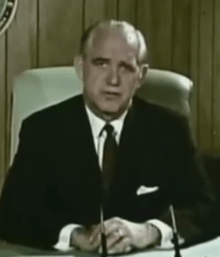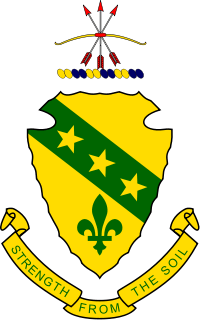John E. Davis (North Dakota politician)
John E. Davis (born John Edward Davis; April 18, 1913 – May 12, 1990) was Director of the Defense Civil Preparedness Agency from 1969 to 1976. He previously served as the National Commander of The American Legion, from 1966 to 1967, and as the 25th Governor of North Dakota from 1957 to 1961.
John Davis | |
|---|---|
 | |
| Director of the Defense Civil Preparedness Agency | |
| In office May 5, 1972 – January 20, 1977 | |
| President | Richard Nixon Gerald Ford |
| Preceded by | Position established |
| Succeeded by | Bardyl Tirana |
| Director of the Office of Civil Defense | |
| In office May 20, 1969 – May 5, 1972 | |
| President | Richard Nixon |
| Preceded by | Joseph Romm |
| Succeeded by | Position abolished |
| National Commander of the American Legion | |
| In office 1966–1967 | |
| Preceded by | Eldon James |
| Succeeded by | William E. Galbraith |
| 25th Governor of North Dakota | |
| In office January 9, 1957 – January 4, 1961 | |
| Lieutenant | Francis Duffy Clarence P. Dahl |
| Preceded by | Norman Brunsdale |
| Succeeded by | William L. Guy |
| Personal details | |
| Born | John Edward Davis April 18, 1913 Goodrich, North Dakota, U.S. |
| Died | May 12, 1990 (aged 77) Rancho Mirage, California, U.S. |
| Political party | Republican |
| Spouse(s) | Pauline Huntley
( m. 1938; div. 1978)Marilyn Westlie ( m. 1980–1990) |
| Children | 3 |
| Education | University of North Dakota (BS) |
| Military service | |
| Allegiance | |
| Branch/service | |
| Years of service | 1941–1945 |
| Rank | |
| Commands | 1st Battalion, 134th Infantry |
| Battles/wars | World War II |
| Awards | |
Early life
Davis was born in Goodrich, North Dakota. After attending several years of high school in Fargo, he graduated from Bismarck High School in 1931. Later that fall, he enrolled at the University of North Dakota in Grand Forks. While at the University, he pledged for Beta Theta Pi, and was active in the Reserve Officers' Training Corps (ROTC). He was the ranking officer in Scabbard and Blade, an organization of select senior ROTC cadet officers. Davis graduated with a Bachelor of Science in Commerce in 1935. He returned to Goodrich and took over management of his family's ranch and farm. Davis was married to Pauline Huntley in 1938, and they had three children; John Jr., Richard, and Kathleen.[1] The couple divorced after forty years of marriage in 1978, after which he married Marilyn R. Westlie in 1980.
World War II
In May 1941, Davis reported first to Fort Snelling, Minnesota, before being sent to Camp Joseph T. Robinson, Arkansas, where he became commander of Company C, 1st Battalion, 134th Infantry, 35th Infantry Division. He saw extensive combat duty in the European Theater, and received the Silver Star Medal, the Bronze Star Medal, and the Purple Heart. He was discharged from the United States Army on July 31, 1945, from Camp McCoy, Wisconsin.
Political career
In 1946, Davis was elected mayor of McClusky, North Dakota, serving until 1952. That year, he successfully ran for a position in the North Dakota State Senate. He served in the Senate until 1956, when he was nominated for Governor on the Republican ticket. He defeated the Democratic candidate, Wally Warner, in the fall election. He was re-elected in 1958, defeating the Democratic candidate, John F. Lord, and served until 1960.[2] He was a candidate for the United States Senate in 1960, but was narrowly defeated by Quentin N. Burdick. He was again a candidate in 1964, but lost the Republican primary to Tom Kleppe. In 1966, Davis was honored with the Sioux Award, the University of North Dakota Alumni Association's highest honor. Davis was elected The American Legion National Commander from 1966 to 1967, and was appointed Director of the Office of Civil Defense by President Richard Nixon in 1969. The agency was renamed in 1972 as the Defense Civil Preparedness Agency. Following his retirement in 1976, he was awarded the Department of Defense Service Medal.
Later life
In 1977, Davis returned to North Dakota to operate the family ranch and resume presidency of the First National Bank of McClusky. In 1978, he received the Greater North Dakota Award from the Greater North Dakota Association. Davis was active in many non-profit organizations, including the Elks, Masons, and the Scottish Rite and the Shrine. He died on May 12, 1990, in Rancho Mirage, California. He is buried in Fairview Cemetery, Bismarck, North Dakota.
See also
- North Dakota's United States Senate special election, 1960
References
- "John E. Davis". Soylent Communications. Retrieved September 6, 2012.
- "John E. Davis". National Governors Association. Retrieved September 6, 2012.
Further reading
- "'It Was Easy to Get Involved': An Interview with Governor John E. Davis." Edited by Gerald G. Newborg. Gerald G. Newborg. North Dakota History.v70, n1 (2003): 2–25.
External links
- John E. Davis at Find a Grave
- John E. Davis at the National Governors Association
- John E. Davis Papers at the University of North Dakota
